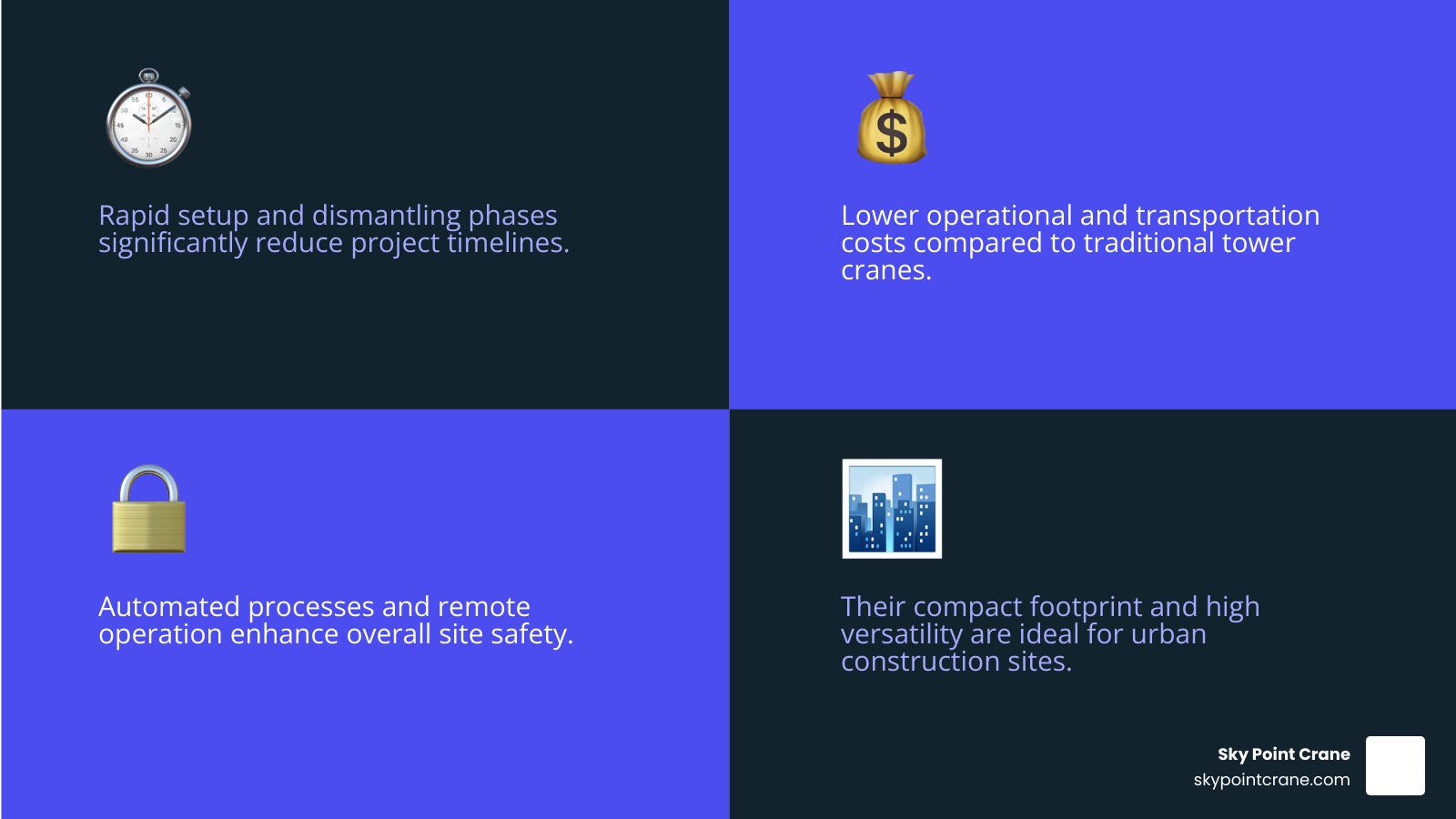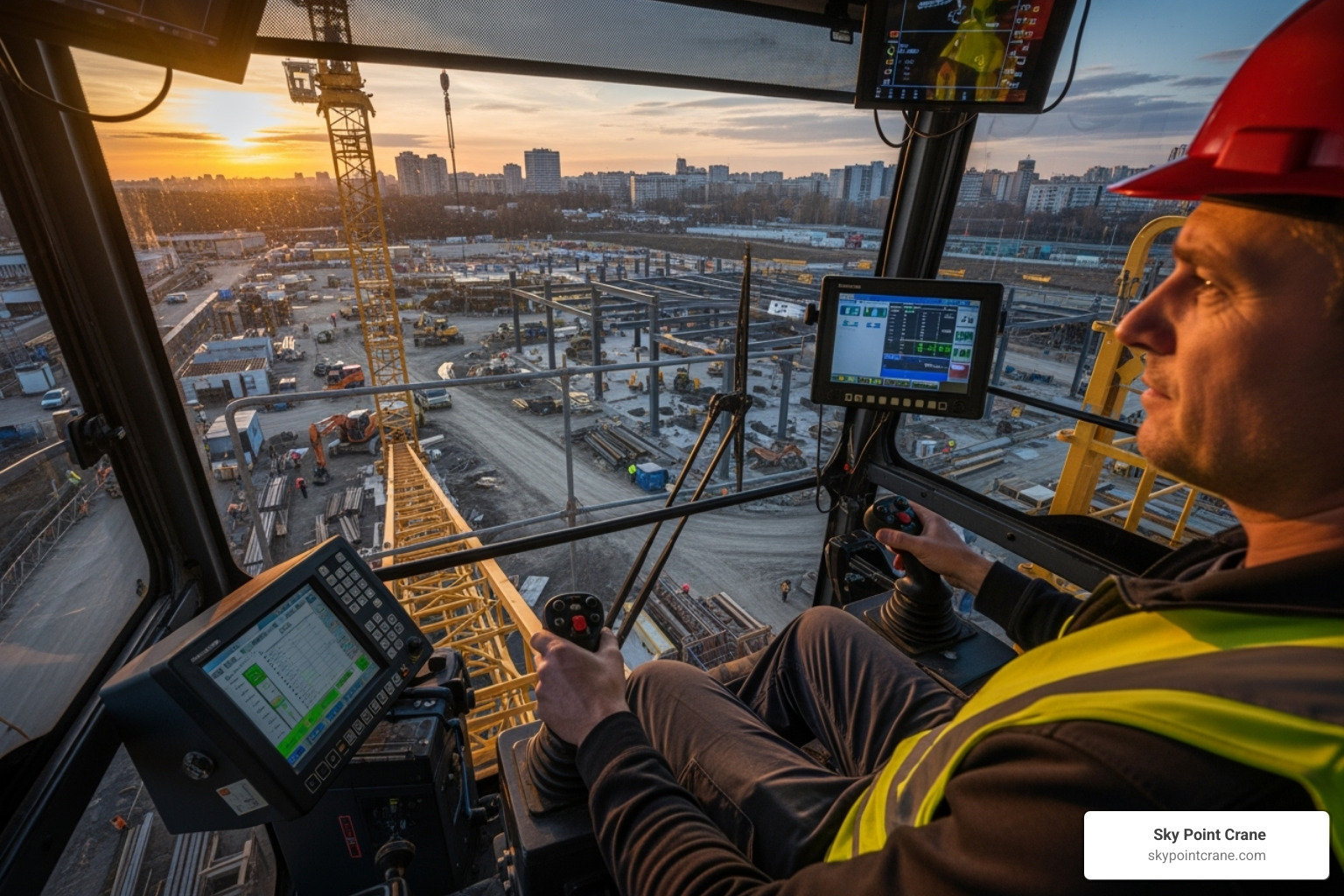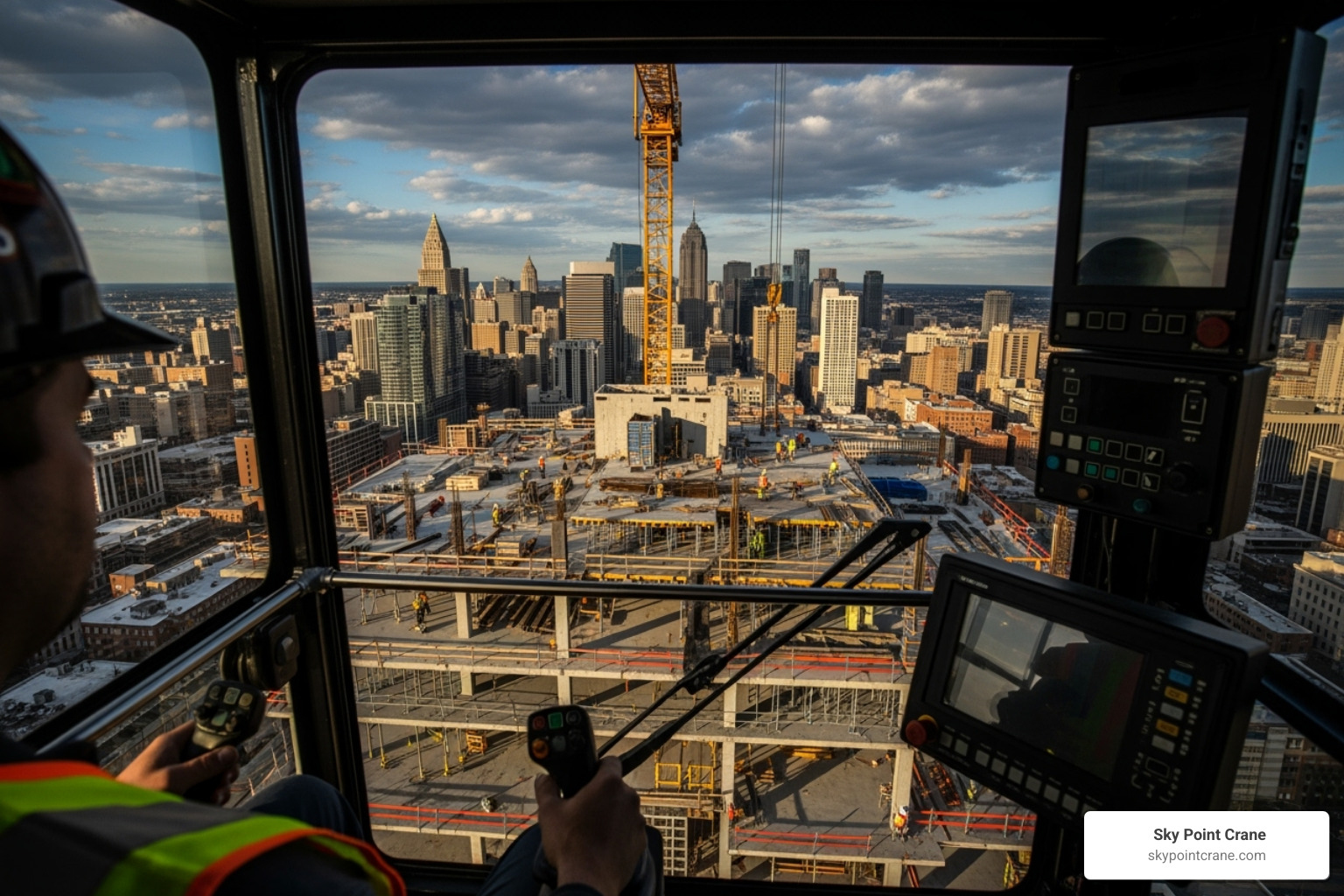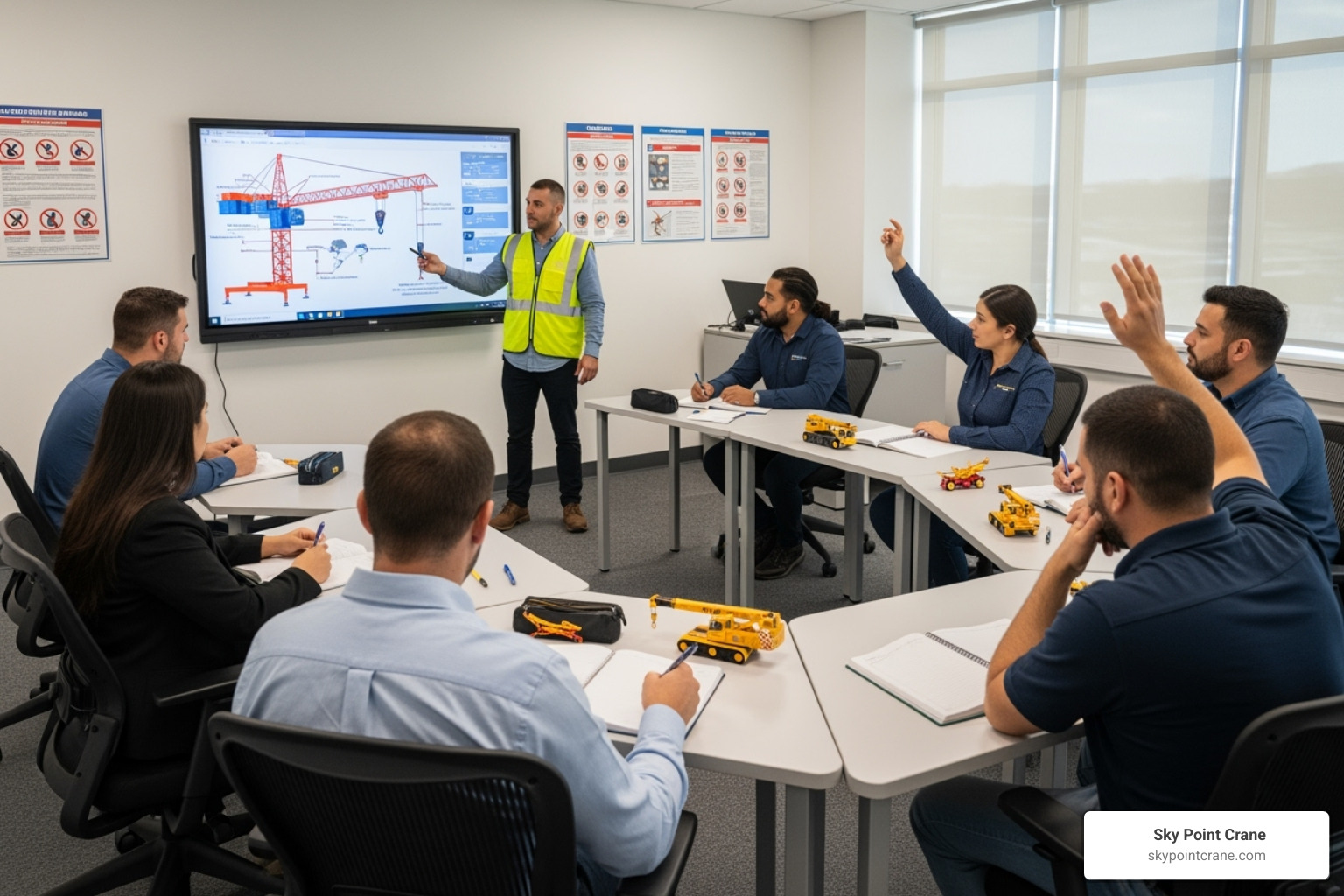Introduction: Your Path to the Operator’s Cab
Starting on a career in heavy machinery operation is an exciting journey. For those looking to specialize in modern construction, understanding self-erecting tower crane training is crucial.
If you’re considering this path, here’s a quick look at what you need to know:
- What it is: Specialized training to safely operate compact, automated self-erecting tower cranes.
- Why it’s important: Ensures safety, complies with regulations, and boosts efficiency on job sites.
- Typical Duration: Most programs take 1 to 4 weeks to complete.
- Estimated Cost: Full certification can range from $1,500 to $3,000.
- Certification: Involves both written and practical exams, usually valid for 5 years.
This guide will walk you through everything, from what the training covers to the career benefits you can expect.
Dave Brocious is an executive leader with over 30 years of experience in building effective teams and solving business problems. His expertise includes strategy, sales management, and distribution, making him uniquely qualified to discuss self-erecting tower crane training and its impact on the construction industry. Let’s dive deeper into these amazing machines.

Self erecting tower crane training vocab explained:
Why Specialized Self-Erecting Tower Crane Training is Essential

Operating sophisticated self-erecting tower cranes isn’t something you can learn from watching videos. Self-erecting tower crane training is essential because these machines are unlike anything else on a construction site. While they may look similar to other tower cranes, they set themselves up automatically, work in tight spaces, and have unique operational characteristics.
Safety standards are the biggest reason specialized training matters. When you’re handling loads weighing thousands of pounds high above people, there’s no room for guesswork. OSHA compliance requirements aren’t just paperwork; they exist because crane accidents can be catastrophic. Proper training prevents you from causing a serious incident.
The risk reduction from proper training is huge. A well-trained operator understands load charts, reads warning signs, and can spot potential hazards before they become real problems. This knowledge improves safety and boosts site efficiency dramatically. When an operator is well-trained, jobs run smoother and faster. That’s why Understanding the Importance of Crane Safety is so crucial.
Legal requirements are another key piece of the puzzle. Most states and insurance companies require certified operators for tower cranes. Lacking proper certification can shut down a job site. To understand why this training is so specialized, it helps to know How Do Self-Erecting Tower Cranes Work?. These machines have automated systems that require different skills and knowledge.
Prerequisites: Are You Ready to Start?
Before you start self-erecting tower crane training, make sure you meet these common-sense requirements.
First, you need to be at least 18 years old. This age requirement ensures the maturity and legal responsibility needed for operating heavy machinery. You’ll also need a high school diploma or GED, which provides the foundation for the technical reading and complex safety procedures in the training.
Physical fitness is more important than you might think. You’ll spend time in the cab, but you also need to climb to it, perform pre-inspection walks, and handle setup tasks. Good vision is critical for seeing clearly at various distances and having solid depth perception for accurate load placement.
Excellent hand-eye coordination is one of the most important skills. You’re controlling multiple functions at once while monitoring your load, the surrounding area, and communicating with ground crews. Many training programs also require prerequisite qualifications in areas like rigging and signaling so you can understand how loads are prepared and communicate effectively.
Core Curriculum: Skills Covered in Self-Erecting Tower Crane Training
The training curriculum is designed to turn a complete beginner into a confident, safety-focused operator.
You’ll start by learning all crane components, from the mast and jib to the counterweights. Understanding how these parts work together is key to safe and efficient operation. Pre-operation inspection becomes second nature; this daily checklist is your first line of defense against equipment failure.
Site preparation and safe setup procedures are where self-erecting cranes show their uniqueness. You’ll learn to assess ground conditions, set up outriggers and leveling systems, and guide the crane through its automated setup.
Load chart interpretation and load weight calculation are absolutely critical skills. These charts tell you what the crane can safely lift, and mistakes can lead to tipping the crane or dropping a load. You’ll also master hand signals and communication protocols to work effectively with ground crews.
Emergency protocols round out your training, teaching you how to respond quickly and safely when things go wrong. For more comprehensive safety information, check out Crane and Rigging Safety.
The skills you’ll master include: pre-operational inspection, site preparation and setup, load chart interpretation, precise load handling, effective communication, emergency response, and safe dismantling procedures.
The Blueprint for Certification: What to Expect

After completing your self-erecting tower crane training, the next step is earning your certification. In the United States, the gold standard for crane operator certification is from the National Commission for the Certification of Crane Operators (NCCCO). This nationally recognized program proves you are qualified and ready to work safely.
Certification is a clear sign of your skill and commitment to job site safety. The process involves two main parts: a written exam to test your knowledge and a practical exam to demonstrate your hands-on ability. Passing both means you’re ready for real-world operations.
NCCCO certification for tower crane operators is typically valid for five years. You must go through a recertification process within the 12 months before your current certification expires. This ensures operators stay current with best practices and safety rules. For more details, check out our article on Understanding NCCCO Certification.
The Certification Journey: Exams and Timelines
Your journey to becoming a certified operator leads to the NCCCO exams. The process includes a written test and a hands-on practical exam. The written exam has about 90 questions covering crane mechanics, safety rules, and load charts, testing your grasp of the theory behind safe operation.
The practical exam is your chance to demonstrate your operating skills. It’s a timed test where you’ll perform specific maneuvers with a self-erecting tower crane while an examiner observes your safety and proficiency.
The time to get certified can vary. Intense programs may take two weeks, but full tower crane certification, including self-erecting tower crane training, typically takes 1 to 4 weeks. Full-time courses focused on NCCCO certification often run for 5 to 10 days. After training, you might wait 1 to 2 weeks for an exam date, and another 1 to 3 weeks to receive your official certification.
Your NCCCO certification has a 5-year cycle, and you must recertify within the 12 months leading up to its expiration. This is a vital step to ensure you stay up-to-date with industry standards. To learn more, visit The National Commission for the Certification of Crane Operators (NCCCO).
What to Expect from a Self-Erecting Tower Crane Training Program
A great self-erecting tower crane training program mixes classroom learning with hands-on practice to prepare you for both written and practical exams.
You’ll spend time in the classroom on the theory of crane operation, covering safety rules (OSHA and ASME standards), crane physics, load charts, and job site communication. Workbooks and practice quizzes help reinforce the material.
Hands-on practice provides valuable “seat time” in a self-erecting tower crane. This practical experience, guided by expert instructors, is essential for building the muscle memory and instincts for safe operation. During these sessions, you’ll master the unique crane controls, startup and shutdown procedures, and various load handling exercises. The goal is precise placement and smooth operation, which sharpens your focus and hand-eye coordination.
Finally, a good program also covers safe dismantling procedures, teaching you how to properly fold the crane back into its transportable state. Some top-notch programs offer on-site training for custom instruction in a real-world setting. At Sky Point Crane, we understand The Importance of Investing in Crane Safety Training for our operators and the industry.
Investing in Your Future: Costs and Career Rewards

Thinking about a career as a self-erecting tower crane operator? It’s more than just learning to handle big machines. It’s about making a smart investment in yourself and your future. Just like any special skill, there’s a cost for self-erecting tower crane training and getting certified. But here’s the good news: this investment often pays off big time! You’ll find better career chances and a lot more job security.
Our cities are always growing, and new buildings and projects pop up all the time. This means there’s a steady need for skilled crane operators. When you get certified, you open doors to many more job options. You become a highly valued professional in the construction world.
Understanding the Costs of Certification
The price tag for self-erecting tower crane training and certification can change quite a bit. It depends on things like where you train, how long the course is, and if you’re getting certified for the first time or just renewing your credentials.
Here’s a general idea of what you might expect to pay in the United States:
| Certification Type | Estimated Cost Range | Notes |
|---|---|---|
| Initial Training & Certification | $1,500 – $3,000 | This usually covers classroom lessons, hands-on practice, and exam prep. Some full packages average around $2,500. |
| NCCCO Written Exam Fee | $200 – $300 | This fee goes straight to NCCCO for the written test. |
| NCCCO Practical Exam Fee | $60 – $100 | This fee goes to NCCCO for the hands-on driving test. |
| Recertification | $300 – $800 | You’ll need to do this every 5 years for NCCCO. The cost changes if you need a full refresher course or just the exams. |
A few things can make the costs go up or down. For example, longer, more intense courses with lots of hands-on time will naturally cost more. Access to real cranes for practice can also add to the fee; some places might charge for crane rental for practice, perhaps around $500 a day. Your location can also affect prices, even though the national certification fees are the same everywhere.
You might also find different prices for group versus individual training. Some providers give discounts if you sign up with a group. For instance, open enrollment might be $1,450, but a group of 8 or more could pay $1,350 per person. And for custom on-site training, a single-day session could be $2,950, while multi-day sessions might be $2,750 per day.
While these costs might seem like a lot upfront, think of it as paying for a ticket to a very rewarding career!
Career Benefits of Becoming a Certified Operator
The money you put into self-erecting tower crane training and certification really pays off. Becoming certified isn’t just about learning a new skill. It’s about opening up a whole new world of professional chances and feeling secure in your job.
One of the best parts is increased earning potential. Certified tower crane operators make great money. You can expect to earn an average hourly rate between $25 and $40. When you look at annual income, a Tower Crane Operator’s salary usually lands between $52,000 and $83,000. That’s much higher than many other construction jobs, showing just how specialized and important this skill is.
You’ll also find great job security. With all the construction happening in Western and Central Pennsylvania, Ohio, West Virginia, and Maryland, skilled crane operators are always needed. Being certified makes you a highly desired professional, giving you peace of mind about your job. This also leads to expanded employment opportunities. Many companies and job sites absolutely require NCCCO certification. Without it, your options would be very limited. Certification truly “levels up your career,” letting you work on bigger, more exciting projects.
Beyond the money, there’s also the joy of professional skill development. When you become a certified operator, you gain a highly respected and specialized skill set. You’ll get to be part of “epic construction projects,” enjoying a “front-row seat to some of the coolest construction work around.” The continuous learning and the challenge of operating these “massive, high-tech machines” can be incredibly satisfying.
At Sky Point Crane, we are very proud of our team of NCCCO Certified Crane Operators. We know that their expertise is key to our success and to keeping our clients’ projects safe.
Finding an Accredited Training Program

So you’re ready to take the plunge into self-erecting tower crane training? That’s exciting! Now comes the important task of finding the right program. Think of this as choosing the foundation for your new career – you want it to be solid, reputable, and recognized throughout the industry.
The good news is that there are several excellent paths you can take. Vocational schools and technical colleges often offer comprehensive heavy equipment operator programs that include specialized crane training. These institutions typically provide structured learning environments with dedicated facilities and experienced instructors who understand both the theory and practical aspects of crane operation.
Union training centers represent another fantastic option, especially if you’re already connected to the construction industry or planning to join a union. These centers are known for their thorough, hands-on approach and often have strong connections to employers looking for certified operators. The training is typically top-notch because unions have a vested interest in ensuring their members are highly skilled and safe.
Private training companies have become increasingly popular, and for good reason. Many specialize specifically in crane operator training and NCCCO exam preparation. These companies often offer more flexible scheduling and can sometimes provide more personalized attention. Some are even manufacturer-backed – for instance, those offered through crane manufacturer dealer networks can provide what industry professionals call a “turnkey solution” for training and certification.
You might also encounter manufacturer-specific training programs. While these are often geared toward technicians and focus on erection, disassembly, maintenance, and troubleshooting of specific crane models, they can offer valuable insights into the unique characteristics of different self-erecting cranes.
When evaluating any program, accreditation is absolutely crucial. You want to ensure your training will be recognized nationwide, not just in your local area. Look specifically for programs that prepare you for NCCCO certification – this should be clearly stated in their materials.
Nationally recognized programs are your best bet because they follow standardized curricula and maintain consistent quality standards. The NCCER Tower Crane Operator curriculum provides an excellent example of what comprehensive training should look like, with detailed breakdowns of topics and specific hours allocated to each module.
Before you commit to any program, take time to verify their credentials. Don’t be shy about asking tough questions: What are the instructor qualifications? What’s their success rate for students passing certification exams? Do they have actual self-erecting cranes available for hands-on practice? These questions might feel awkward to ask, but they’re essential for ensuring you’re making a smart investment in your future.
The importance of accreditation can’t be overstated – it’s the difference between having a certificate that opens doors everywhere versus one that might only be recognized locally. Make sure any program you choose has a solid track record and can provide references from successful graduates who are now working in the field.
Frequently Asked Questions about Self-Erecting Tower Crane Training
As you consider pursuing self-erecting tower crane training, you probably have some burning questions. We’ve heard these same questions countless times from aspiring operators, so let’s tackle the most common ones head-on.
How long is a self-erecting tower crane certification valid?
Your NCCCO certification is good for five years from the date you pass your exams. That’s plenty of time to gain experience and really master your craft!
But here’s the important part: you can’t just wait until the last minute. You need to start your recertification process within the 12 months before your certification expires. Think of it like renewing your driver’s license – you don’t want to be caught operating without valid credentials.
The recertification process helps ensure you stay current with safety standards and industry best practices. After all, construction technology and safety regulations continue to evolve, so staying sharp is crucial for your career and everyone’s safety on the job site.
Do I need separate training if I can already operate other tower cranes?
Absolutely, yes! Even if you’re already comfortable operating traditional tower cranes, self-erecting tower crane training is essential. These machines are like the Swiss Army knives of the crane world – compact, versatile, but requiring specialized knowledge.
Self-erecting cranes have unique characteristics that set them apart. Their automated setup and dismantling processes are completely different from traditional tower cranes. You’ll be working with hydraulic systems that unfold the crane automatically, and many operations are controlled from ground level rather than from a cab high in the air.
The rapid deployment capability and compact design mean you need specific knowledge of their hydraulic systems and the exact sequence of operations. It’s like the difference between driving a manual transmission car and an automatic – they’re both cars, but the operation is fundamentally different.
What’s the most important skill for a self-erecting crane operator?
While precision and hand-eye coordination are absolutely vital (you’ll be placing loads within inches of their target), we’d argue that a deep understanding of stability and setup procedures takes the top spot.
Here’s why: everything else depends on getting the setup right. Safe operation begins with a correctly erected and leveled crane. You need to become an expert in meticulous site assessment, ensuring the ground conditions can support the crane’s weight and forces.
Proper outrigger deployment is critical – these support legs distribute the crane’s load, and getting them wrong can lead to catastrophic tipping. You’ll also need to master the manufacturer’s specific erection sequence, which varies between different models and brands.
Think of it this way: you can have the steadiest hands in the business, but if your crane isn’t properly set up and stable, none of that precision matters. A solid foundation – literally – is where safe crane operation begins and ends.
Conclusion: Lift Your Career with Expert Training
Choosing self-erecting tower crane training isn’t just about learning to operate another piece of equipment – it’s about investing in a career that literally helps build the world around us. When you complete this specialized training, you’re not only gaining valuable skills, you’re joining a community of professionals who take pride in precision, safety, and getting the job done right.
The journey we’ve outlined – from understanding the prerequisites to achieving NCCCO certification – might seem challenging at first. But here’s the thing: every successful crane operator started exactly where you are now. The difference between dreaming about this career and actually living it comes down to taking that first step toward proper training.
Professional development in this field means more than just earning good money (though that $25-$40 per hour certainly doesn’t hurt!). It means developing skills that are genuinely respected in the construction industry. When you’re certified to operate self-erecting tower cranes, you become the person everyone depends on to make complex lifts look effortless.
The value of certification extends far beyond the piece of paper you’ll receive. It represents your commitment to doing things the right way, every single time. Whether you’re setting up a crane on a tight urban job site or carefully placing a load with millimeter precision, your training becomes the foundation that keeps everyone safe and projects moving forward.
At Sky Point Crane, we’ve seen how expert training transforms not just individual careers, but entire job sites. Our NCCCO certified operators bring that same level of expertise to every project across Western and Central Pennsylvania, Ohio, West Virginia, and Maryland. We know that behind every successful lift is an operator who took their training seriously.
Career advancement in this field isn’t just possible – it’s practically inevitable for those who commit to excellence. The construction industry will always need skilled professionals who can handle complex equipment safely and efficiently. By choosing self-erecting tower crane training, you’re positioning yourself at the forefront of modern construction technology.
So if you’re ready to take control of your future and join a profession where every day brings new challenges and accomplishments, this is your moment. The training might require dedication, but the rewards – both financial and personal – make it all worthwhile.
Ready to see what expert crane operation looks like in action? Get in touch for your next project’s lifting needs. We’d love to show you how the right training and experience can make all the difference on your next project.
